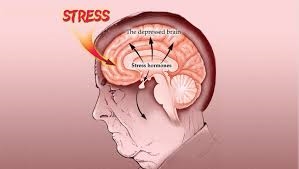Depression

What the Disease Is
Depression, clinically known as major depressive disorder (MDD), is a widespread mental health issue that profoundly affects an individual’s emotional state, cognitive function, and overall physical health. It is marked by persistent feelings of sadness, hopelessness, and a significant lack of interest or pleasure in activities that were once enjoyable. This condition goes beyond temporary mood fluctuations, leading to emotional distress and physical health problems that can disrupt daily life, work responsibilities, and personal relationships. Individuals grappling with depression may find it increasingly difficult to function in their everyday lives, highlighting the need for professional intervention and effective treatment to regain a sense of normalcy and well-being.
Causes of Depression
The development of depression is influenced by a variety of factors, each playing a significant role in its onset. Genetic predisposition is one of the key contributors; individuals with a family history of depression are more likely to experience similar issues, suggesting that hereditary elements may impact brain chemistry and emotional regulation. Biochemical changes in the brain, particularly involving neurotransmitters such as serotonin, norepinephrine, and dopamine, are often implicated in the onset of depressive symptoms. These neurotransmitters are essential for mood regulation, and any imbalances can lead to feelings of sadness and despair.
Hormonal fluctuations also contribute to depression. Events such as pregnancy, menopause, or thyroid disorders can trigger hormonal changes that precipitate depressive episodes. Additionally, stressful life events—including the loss of a loved one, divorce, or financial troubles—can act as significant stressors that lead to depression. Chronic medical conditions like diabetes and ongoing pain can exacerbate feelings of hopelessness, creating a cycle of worsening mental health. Substance abuse is another critical factor; the use of drugs or alcohol can either contribute to the development of depression or intensify existing symptoms. Lastly, social circumstances such as isolation or lack of supportive relationships can heighten the risk of developing depression.
Predisposing Factors
Several predisposing factors can increase an individual’s vulnerability to depression. A family background of depression can raise one’s risk, pointing to the interplay of genetic and environmental factors. Personality characteristics also play a role; individuals who exhibit low self-esteem, excessive self-criticism, or a generally pessimistic view of life are often more susceptible. Experiences of trauma during childhood, such as abuse or neglect, can significantly impact emotional resilience and contribute to future depressive episodes. Chronic stress, whether from work pressures, financial strain, or relationship difficulties, can lead to heightened emotional fatigue, further increasing susceptibility. Moreover, lifestyle choices, including poor nutrition, lack of exercise, and inadequate sleep, can negatively affect mental health and create conditions favorable for depression.
Signs and Symptoms
Depression manifests through a range of symptoms that can vary in severity and duration among individuals. A prevalent symptom is persistent sadness or an enduring sense of emptiness that does not seem to lift. Individuals may also experience a notable decline in interest or enjoyment in activities that they previously found pleasurable, including hobbies and social interactions. Fatigue or a chronic lack of energy, even after adequate rest, is another common symptom, making even simple tasks feel daunting. Changes in sleep patterns, whether insomnia or excessive sleeping, are frequently observed, along with significant fluctuations in appetite, leading to noticeable weight changes.
Cognitive difficulties are also associated with depression; individuals may struggle with decision-making, concentration, or memory, which can further impact their daily lives. Feelings of worthlessness or excessive guilt may plague individuals, along with recurrent thoughts of death or self-harm. Furthermore, physical manifestations such as unexplained aches, headaches, or chronic pain can accompany depressive episodes, complicating the clinical picture.
Treatment and Management
Addressing depression effectively often requires a combination of medical treatment and therapeutic support. Medications, particularly antidepressants, are a cornerstone of treatment for many individuals. Commonly prescribed classes of medications include selective serotonin reuptake inhibitors (SSRIs) and serotonin-norepinephrine reuptake inhibitors (SNRIs), which help restore balance to the brain’s neurotransmitter levels. For those with more complex mood disorders, mood stabilizers may be utilized alongside antidepressants to help regulate emotional swings.
Psychotherapy is another essential component of effective depression management. Cognitive Behavioral Therapy (CBT) is widely recognized for its efficacy in changing negative thought patterns that contribute to depression. Other therapeutic modalities, such as Interpersonal Therapy (IPT) and Psychodynamic Therapy, also play vital roles by addressing interpersonal dynamics and exploring underlying emotional conflicts, respectively. In addition to medical and therapeutic approaches, lifestyle modifications are crucial for managing depression. Regular physical activity can enhance mood and overall well-being, while a nutritious diet can positively influence mental health. Establishing good sleep hygiene practices, cultivating strong social connections, and employing stress management techniques such as mindfulness and meditation can all contribute to improved mental health outcomes. Avoiding substance abuse is equally important, as these behaviors can exacerbate depressive symptoms and impede recovery.
Prevention Strategies
Preventing depression involves several proactive measures that can help mitigate risk factors. Early intervention at the first signs of depression is critical; seeking assistance promptly can prevent the condition from escalating. Maintaining a healthy lifestyle—through consistent exercise, a balanced diet, and adequate sleep—can contribute positively to mental health and resilience. Building coping skills and stress management techniques can empower individuals to face life’s challenges more effectively. Cultivating strong social relationships can provide necessary emotional support, reducing feelings of isolation that are often associated with depression. Regular health check-ups with mental health professionals can facilitate ongoing monitoring, helping to identify and address potential issues before they become severe.
Conclusion
Depression is a multifaceted mental health disorder that impacts individuals on emotional, cognitive, and physical levels. Understanding its causes, recognizing its signs and symptoms, and seeking timely and appropriate treatment are essential for managing and overcoming this condition. With effective therapeutic interventions, lifestyle adjustments, and robust support systems, individuals with depression can experience substantial improvements in their quality of life and overall well-being. The journey through depression can be challenging, but with the right resources and a committed support network, recovery is not only possible but achievable.